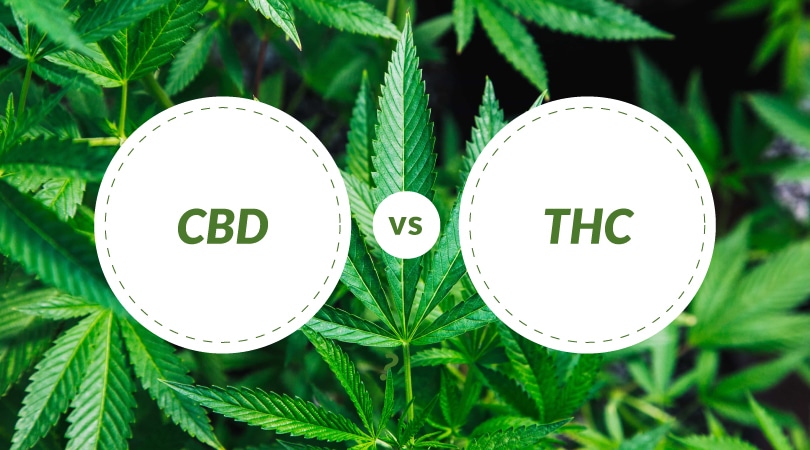
CBD vs. THC: Exploring the Differences and Benefits
There are over 100 natural chemical compounds known as cannabinoids found in the hemp plant. And while all compounds in the plant work together to create an entourage effect, some cannabinoids are more commonly recognized on the market. Most of us have heard of CBD and THC, but all interested or active hemp users should be aware of the differences between these two compounds.
Dive into this topic with us, where we’ll discuss what each cannabinoid is, their chemical structures, benefits, and more.
What Is CBD?
CBD is the second most prevalent active compound found in the hemp plant. CBD offers many benefits (we’ll get to that below), but one of the things that sets it apart from THC is that CBD alone does not have the psychoactive effects that are commonly associated with the hemp plant.
CBD comes in 3 forms: CBD isolate, broad-spectrum, and full-spectrum. CBD isolate is pure CBD; broad-spectrum CBD contains all of the compounds of the hemp plant minus THC; full-spectrum CBD contains all of the compounds of the hemp plant, including THC.
CBD products are sold in the form of oils, salves, gels, gummies, and more.
What Is THC?
THC is the main active compound in cannabis, with its psychoactive effects being the most recognized. There are different types of THC that can be found in the plant, with Delta products being among the most commonly consumed. Each form of THC has different characteristics, allowing consumers to find a product that best fits their preferences.
To better understand how each Delta product compares, read our previous article: How Delta-8 Compares to Alternative Delta Products.
THC products are commonly consumed in the form of oil, shatter, cartridges, and flowers.
CBD vs. THC: Chemical Structure and Properties
CBD and THC have identical chemical structures, consisting of 21 carbon atoms, 30 hydrogen atoms, and two oxygen atoms. So, how can two corresponding chemical formulas result in completely different cannabinoids? The difference between CBD and THC is the way the atoms are arranged, resulting in different chemical properties and different effects on the body.
CBD vs. THC: How They Interact with the Endocannabinoid System
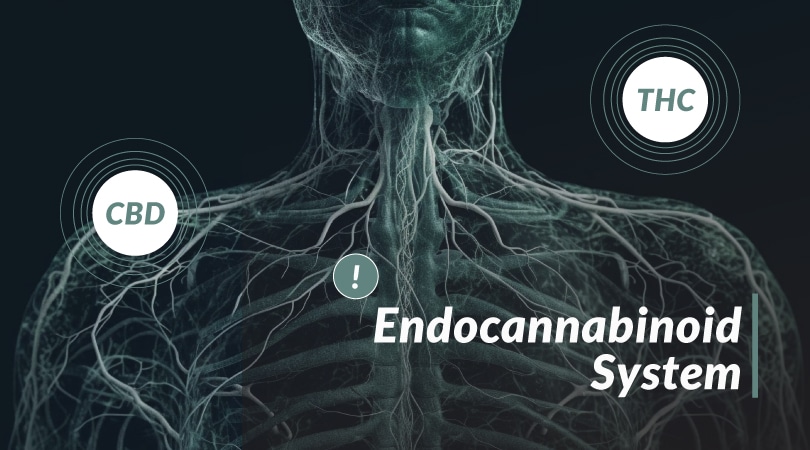
The endocannabinoid system (ECS) is a complex network of receptors that is responsible for regulating and controlling many critical bodily functions, including appetite, mood, learning, and memory, among others. Both CBD and THC interact with the ECS in similar ways, though their effects are different.
Both cannabinoids interact with the ECS by binding to cannabinoid receptors, primarily the CB1 and CB2 receptors. However, CBD interacts in a more indirect way; instead of binding to the receptors, it influences them in a different way. While more research is required to better understand CBD’s interaction with the ECS, many believe it works by preventing endocannabinoids from being broken down, allowing them to have more effects on the body.
THC, on the other hand, directly binds to both CB1 and CB2 receptors in the ECS. This interaction produces the psychoactive effects that THC is recognized for. Even more, the activation of CB1 receptors leads to the release of neurotransmitters and influences various physiological functions, such as memory, pain perception, appetite, and mood.
CBD vs. THC: Health Benefits
Some of the potential health benefits of CBD include:
- Relieves pain
- Reduces arthritis-related symptoms
- Anti-inflammatory and antioxidant properties
- Improves sleep
- Decreases anxiety and depression
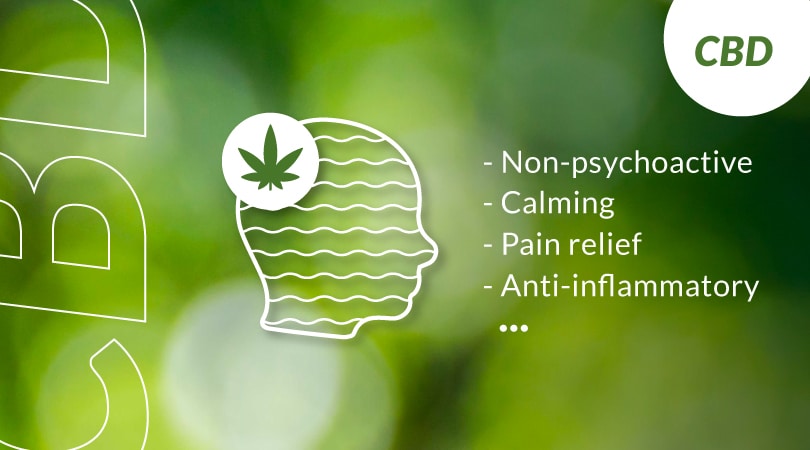
Some of the potential health benefits of THC include:
- Relieves pain
- Improves sleep
- Increases appetite
- Anti-inflammatory and antioxidant properties
- Reduces nausea and vomiting
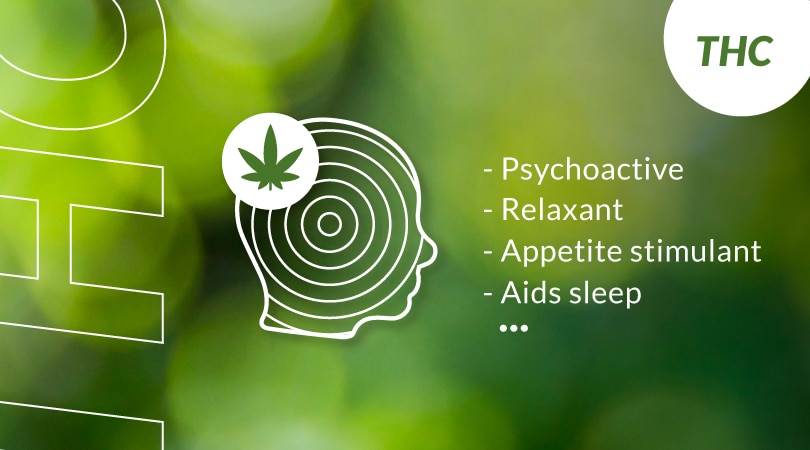
As the lists above show, CBD and THC share many similarities in terms of health benefits. While they interact with the body differently and have varying effects, both cannabinoids can be a great addition to a wellness routine.
CBD vs. THC: Side Effects & Risks
Potential side effects of CBD include:
- Drowsiness
- Dry mouth
- Reduced appetite
- Nausea
- Diarrhea
Potential side effects of THC include:
- Dry mouth
- Impaired judgment
- Memory loss
- Coordination problems
- Bloodshot eyes
- Accelerated heart rate
All hemp-derived products should be taken with caution. If you’re having a negative reaction to your product, there are two main reasons why this could occur: your dosage and the quality of your product. In terms of dosage, you should start small, slowly increasing if necessary; reduce your dosage if you have negative side effects.
The quality of your products also plays a significant role, as low-quality products often contain harmful ingredients, provoking a negative reaction. Always do your research before purchasing a product, and of course, take note of how the product makes you feel and adjust as necessary.
CBD vs. THC: Choosing the Right Option
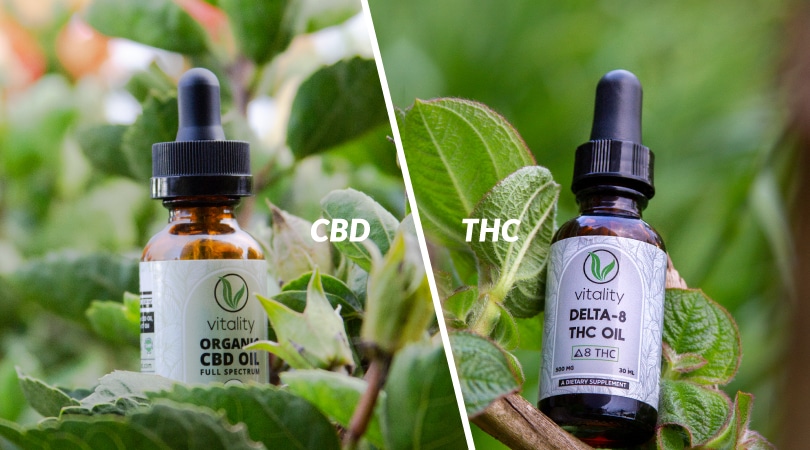
When it comes to choosing between CBD and THC, there is no “better” option, but rather the right option for you. This might look different for everyone, as each person has their own needs and preferences.
While CBD and THC have similar medical benefits, the main difference is THC’s psychoactive effects. If you’re interested in the “high” that THC offers, then it might be the right option for you; for a more relaxed, therapeutic experience, then CBD may catch your attention.
What’s important is that you’re aware of the side effects and benefits of each product. Whether you prefer CBD or THC, there are certain guidelines that you should follow, bringing us to our next point.
CBD and THC: Consumer Guide
Whether you’re team CBD or THC, all consumers should be aware that not all products are made equally. There are a lot of variations in the market in regard to quality. When searching for the right product, you should make sure that the company you purchase from has certificates to prove the quality of their products.
Third-party testing guarantees that your products (and therefore you) have not been exposed to harsh chemicals. These contaminants are used by many companies throughout the production process, exposing customers to low-quality products that don’t offer the same benefits as quality CBD or THC.
These tests also guarantee that the potency is within its legal limit, allowing customers to consume responsibly. At Vitality, all of our products are tested by a third party for quality and potency, making them safe and legal to use for consumers across the country.
Conclusion
Though CBD and THC have identical chemical structures, the way the atoms are arranged and their interaction with the endocannabinoid system create different effects. The biggest difference between these two cannabinoids is that THC has psychoactive effects, while CBD alone does not.
Both products have great health benefits and are becoming increasingly popular in the market as a natural alternative to the pharmaceutical industry. Before choosing which one is right for you, make sure you familiarize yourself with the characteristics of each one and do your research to find a company that only produces high-quality products.
References
Antidepressant-like and anxiolytic-like effects of cannabidiol: a chemical compound of Cannabis sativa – PubMed. (2014, January 1). PubMed. https://doi.org/10.2174/1871527313666140612114838
Antioxidative and Anti-Inflammatory Properties of Cannabidiol – PubMed. (2019, December 25). PubMed. https://doi.org/10.3390/antiox9010021
Cannabidiol in Anxiety and Sleep: A Large Case Series – PubMed. (2019, January 1). PubMed. https://doi.org/10.7812/TPP/18-041
Cannabis-Based Products for Chronic Pain : A Systematic Review – PubMed. (2022, August 1). PubMed. https://doi.org/10.7326/M21-4520
Hammell, D., Zhang, L., Ma, F., Abshire, S., McIlwrath, S., Stinchcomb, A., & Westlund, K. (2015, October 30). Transdermal cannabidiol reduces inflammation and pain-related behaviours in a rat model of arthritis. PubMed Central (PMC). https://doi.org/10.1002/ejp.818
Use of cannabidiol (CBD) for the treatment of chronic pain – PubMed. (2020, September 1). PubMed. https://doi.org/10.1016/j.bpa.2020.06.004
Very low doses of delta 8-THC increase food consumption and alter neurotransmitter levels following weight loss – PubMed. (2004, April 1). PubMed. https://doi.org/10.1016/j.pbb.2004.01.015
